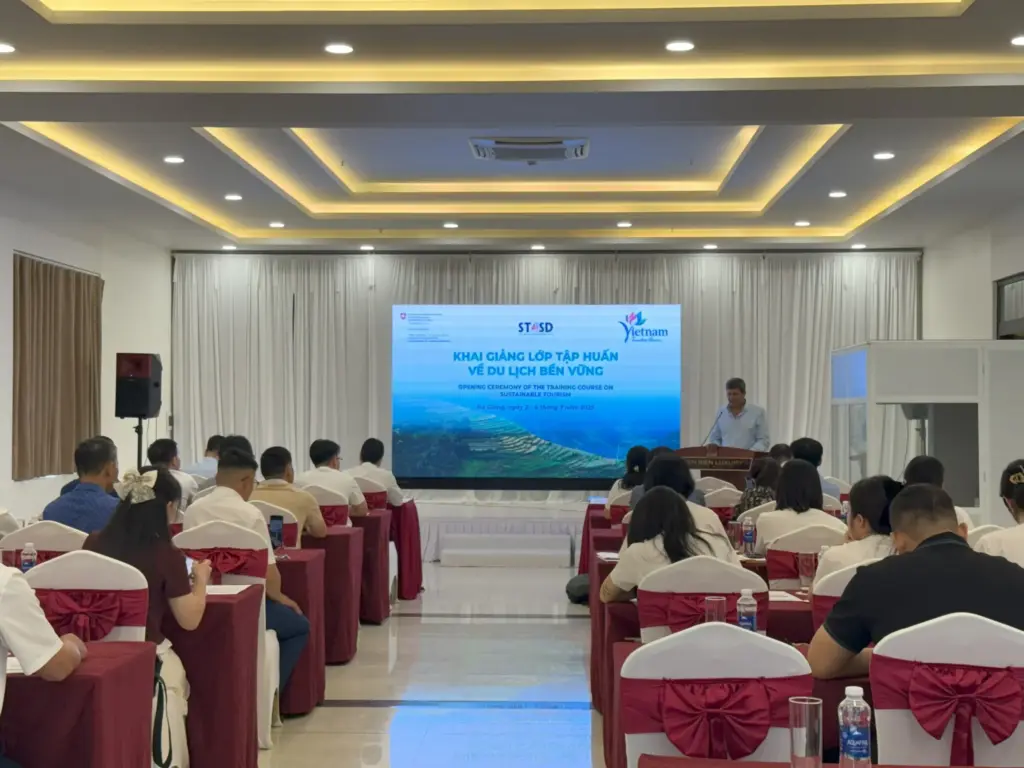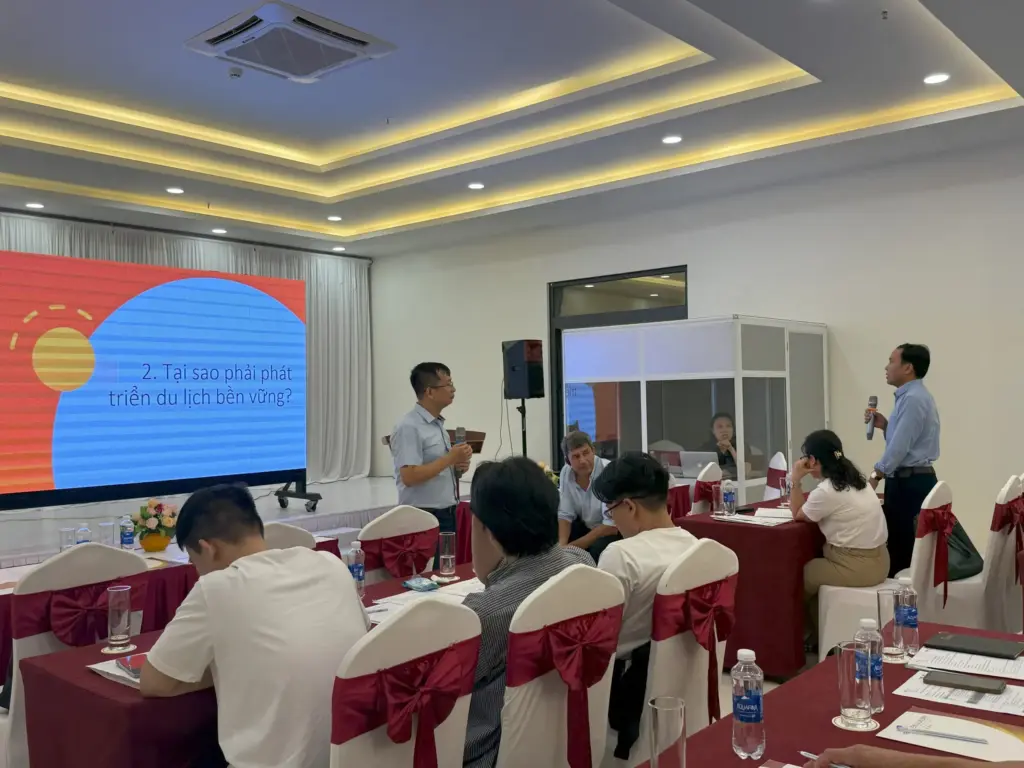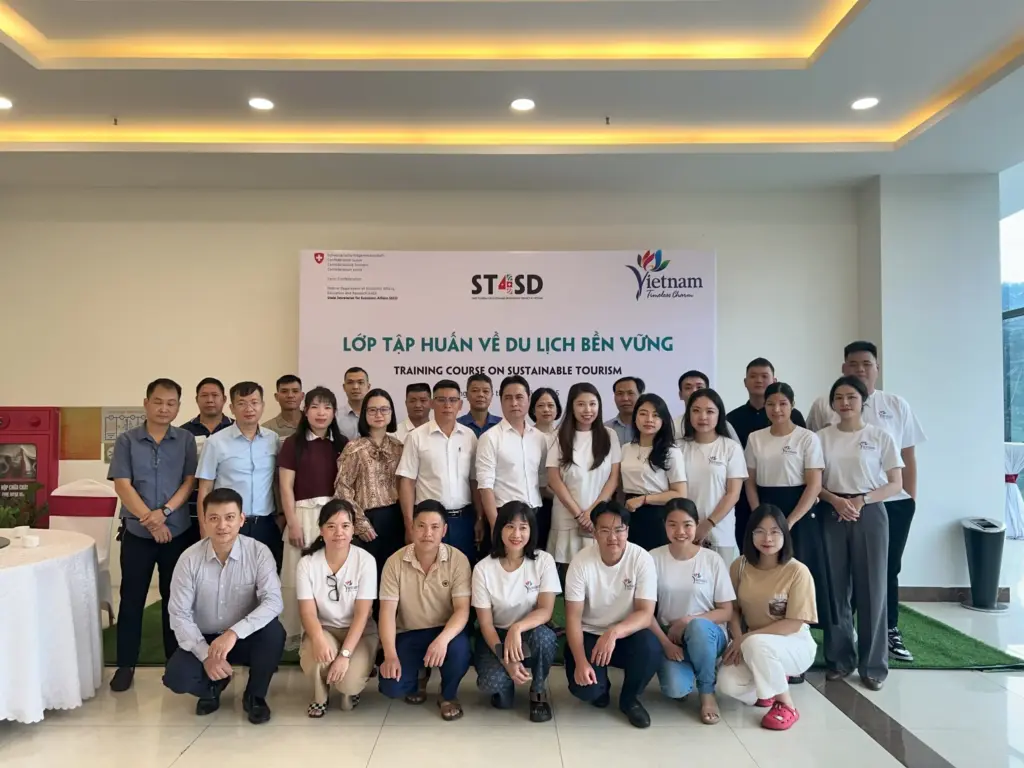
As Vietnam’s tourism industry gradually transitions toward a more sustainable and inclusive model, Hà Giang province (now part of Tuyên Quang province) – known for its rich natural and cultural heritage – has emerged as a leading example in implementing training programs to strengthen grassroots tourism capacity. From July 2 to 4, 2025, a specialized training course on sustainable tourism was held in Hà Giang 1 ward, Tuyên Quang province, gathering 40 participants from a diverse range of sectors.
Funded by the Swiss State Secretariat for Economic Affairs (SECO), the training was organized under the framework of the “Swiss Tourism for Sustainable Development in Vietnam” (ST4SD) project, coordinated by the Department of Culture, Sports and Tourism of Hà Giang in partnership with Helvetas Vietnam, CRED, and with support from the Vietnam National Authority of Tourism (VNAT), acting as the project’s lead agency.
Affirming Vietnam’s Commitment to Sustainable Tourism
The training took place as Vietnam continues efforts to revive its tourism sector following the COVID-19 pandemic while realigning its development strategy around sustainability, community engagement, cultural preservation, environmental protection, and service quality enhancement. Community-based tourism (CBT) – especially in mountainous provinces like Hà Giang (now part of Tuyên Quang province) – is being recognized as a promising pathway consistent with the country’s long-term development goals.
Hosting the training in Hà Giang not only responds to local needs but also contributes to the implementation of national policies such as Vietnam’s Tourism Development Strategy to 2030, the Action Plan to realize the Sustainable Development Goals (SDGs), and international cooperation programs on climate change, cultural heritage preservation, and inclusive development. Hà Giang was one of the first provinces selected for ST4SD’s pilot expansion, following successful interventions in Quảng Nam, Đồng Tháp, and Ho Chi Minh City.
From the project’s perspective, Mr. Olivier Messmer, ST4SD Project Leader, stated:
“We – along with the Swiss Government – believe that sustainable tourism is the key to enhancing destination value while delivering real benefits to local communities. The CBT model in Hà Giang not only has great development potential but can serve as an example for other localities to follow and adapt.”
He also highlighted that Hà Giang stands out as a destination where ethnic cultural heritage, majestic nature, and local community resilience converge. Investment in training, management capacity building, and raising awareness of sustainable tourism will be key to ensuring long-term success.
He further affirmed that ST4SD will continue to accompany local governments in building a responsible tourism ecosystem that ensures the participation of all stakeholders – from authorities and businesses to local residents and travelers.

Diverse Participation Reflects Real Needs
The training welcomed 40 participants, including 17 from the Vietnam National Authority of Tourism, representing departments such as Travel Services, Accommodation, Personnel Management, International Cooperation, and Tourism Promotion. These officers are expected to play key roles in policy consultation and knowledge dissemination on sustainable tourism at the national level.
The remaining 23 participants came from Hà Giang province (now part of Tuyên Quang province), including representatives from the local government, and representatives from community-based tourism villages across districts such as Quản Bạ, Đồng Văn, Mèo Vạc, Vị Xuyên, Quang Bình, and Hà Giang City.
Noteworthy participants included Mr. Nguyễn Văn Long – village head of Tha Village (Hà Giang City), Ms. Vàng Thị Thúy – representative from Khun Village (Quang Bình district), Mr. Chu Minh Quang – head of the Management Board of Pả Vi Hạ CBT Village (Mèo Vạc district), and Mr. Lý Tà Đành – village head of Nặm Đăm Village (Quản Bạ district). The active participation of those directly operating CBT sites illustrates the strategic shift toward placing communities at the center of tourism development.

From Policy to Practice: Strengthening Long-term Capacity
Beyond theoretical learning, the training marks the beginning of a long-term capacity-building journey that connects policy formulation, on-the-ground implementation, and international cooperation. According to the plan, trainees will continue participating in follow-up activities including advanced courses, field visits, and technical support from the ST4SD project.
The outcomes of the training will be synthesized and analyzed to inform policy refinement, the development of practical guidelines, and the creation of a knowledge-sharing network among CBT sites across ST4SD-supported provinces and cities.
Building a Foundation for Sustainable Transformation
This training event offers tangible evidence of a multi-level commitment – from national to local, from international donors to grassroots communities – to steer Vietnam’s tourism sector in a more sustainable and quality-oriented direction.
With ongoing support from development partners, the leadership of national tourism authorities, and the proactive engagement of local communities, Hà Giang (now part of Tuyên Quang province) is gradually positioning itself as a model destination for sustainable tourism in Vietnam, opening the door for broader replication and impact in the years ahead.